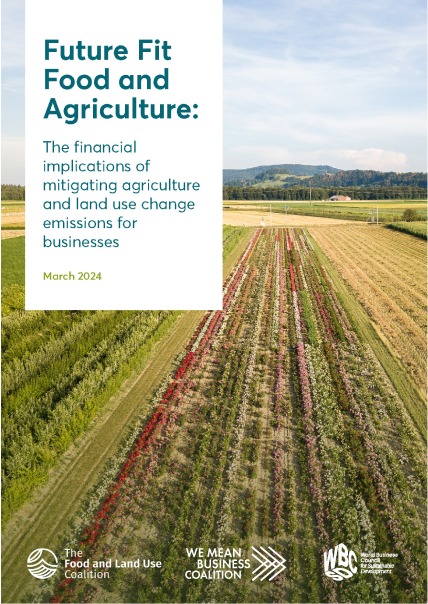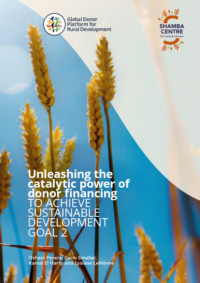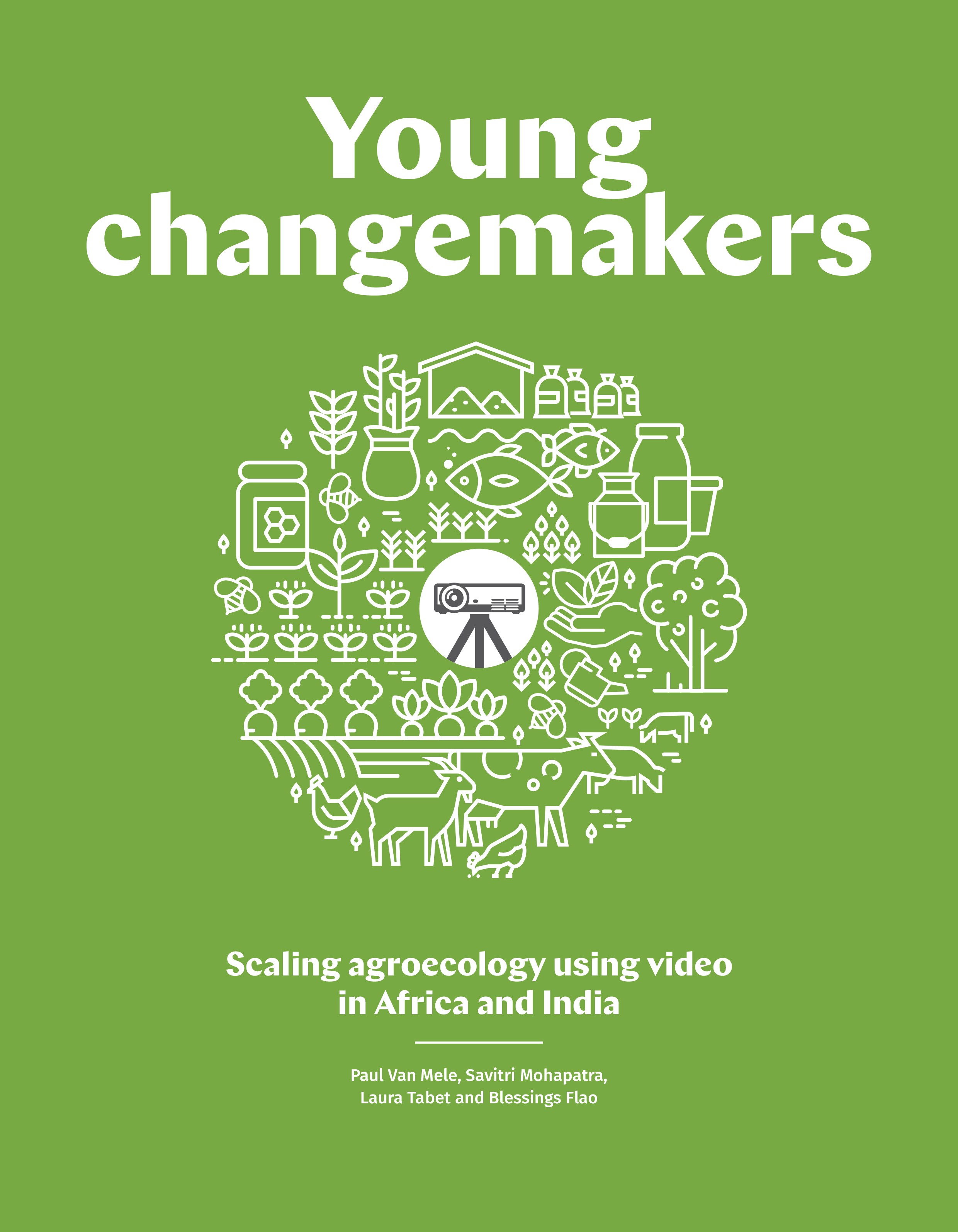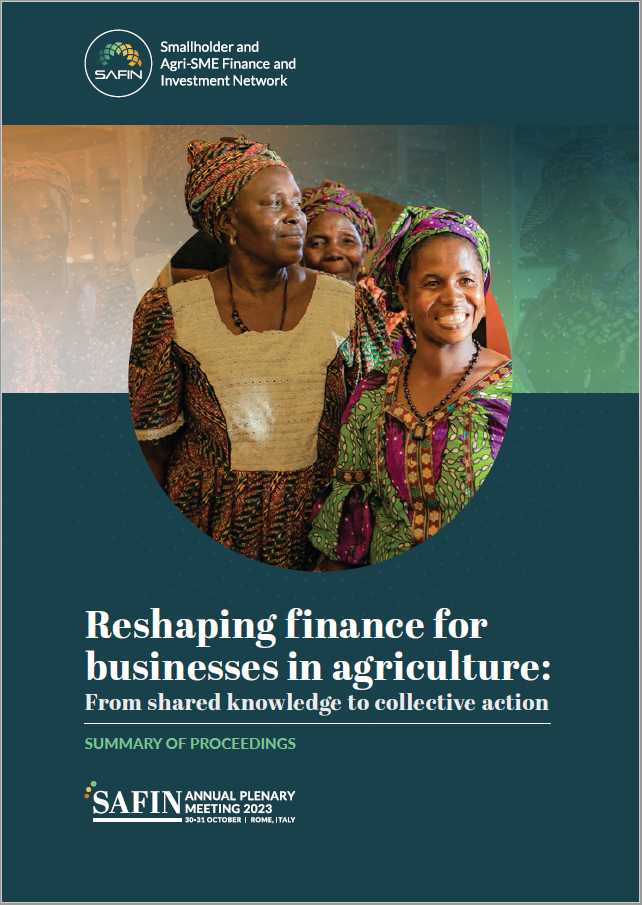Agroecology
- This policy dossier aims to present decision and policymakers and experts in the context of international cooperation with scientific evidence on how AE/O approaches can contribute to a beneficial transformation of production systems in the Tropics.
- Shared 8/05. Side event 49. Agroecological and Organic Farming Systems in Africa– transformation towards System Resilience and Sustainable Production and Consumption 7 – 9 May 2024. Africa Fertilizer and Soil Health Summit (AFSH24)
RAISE (2024) WE, THE CHANGEMAKERS : A Facilitator’s Guide to Empowering Changemakers: Modules for Adolescents and Youths | 2024 Edition #44 pp.
using video in Africa and India. Access Agriculture, Brussels, 175 pp.
- This guidebook on youth and agroecology has been developed by partner organisations of DKA Austria in South Asia through the RAISE Consortium
- This guidebook sheds light on the often-overlooked importance of children and youth as essential stakeholders in transformative change processes.
- It emphasizes active citizenship and youth empowerment and engages adolescents and youth for agroecology based on various modules.
- The guidebook is intended for facilitators in rural areas.
- 2/05 We the Changemakers”: Launching Event of the Facilitators Guide to Empowering Youth Changemakers for Agroecology
using video in Africa and India. Access Agriculture, Brussels, 175 pp.
- From 2019 onwards, Access Agriculture has empowered over 120 teams of young Entrepreneurs for Rural Access (ERAs) across 17 countries in Africa and India. Its coaching and support have been instrumental in providing the ERAs with the skills and resources needed to succeed in their endeavours.
- These ERAs have been equipped with a solar powered smart projector – containing a vast library of more than 270 videos in over 100 languages – which enables them to disseminate knowledge on agroecological practices to farming communities.
KNOWLEDGE BRIEF - Exploring the off-farm production, marketing and use of organic and biofertilisers in Africa #27 pp.
- The study address the use and acceptance of organic and biofertilizers, the potential development of these inputs, the marketing systems, the support services (research and advisory services), the national policies and regulatory framework .
- Recorded: 16/04. InfoPoint Hybrid Conference: The potential of organic and biofertilizers for soil health management in Africa
- Despite claims to the contrary, APCNF is locked in an unchanged productivist paradigm controlled by capital in collaboration with the state. By co-opting agroecology, APCNF closes down options for a just transformation of the dominant agri-food regime.
- See videos and extracts of the report
- Shared on 24/05 South-South and Triangular partnerships for agri-food system transformation
Evaluating the potential and eligibility of conservation agriculture practices for carbon credits Published: 22 April 2024.
Corporate Europe Observatory (2024) DEADLY EXPORTS The chemical industry lobbies to keep exporting even the most dangerous, EU-banned chemicals # 32 pp.
- Carbon credits, a voluntary market mechanism to reduce greenhouse gas (GHG) emissions, can incentivize climate action. This paper evaluates the potential and eligibility of Conservation Agriculture (CA) practices for carbon credit generation in India under Verra's VM0042 methodology.
- Recorded 25/04: Artificial Intelligence for Sustainable Soil Health
Corporate Europe Observatory (2024) DEADLY EXPORTS The chemical industry lobbies to keep exporting even the most dangerous, EU-banned chemicals # 32 pp.
- This report scrutinizes industry arguments against an EU export ban, highlighting six key arguments commonly used by lobbyists and industry.
- The urgency of ending this toxic trade remains. To keep this urgent issue high on the EU political agenda after the elections and achieve the political action that prioritizes public health and environmental protection over industry interests, toxic lobbying tactics should be exposed and minimized. This report calls for toxic free politics, a political environment free from the toxic sector's influence, allowing for the protection of peoples and the environment over industry's interests in Europe and elsewhere.
Food systems
ICRAF (2024) Developing holistic assessments of food and agricultural systems: A meta‑framework for metrics users # 32 pp.- This document puts forward general steps for developing a holistic agrifood system assessment, as well as principles to guide decision making at each step of the design process, intended to support metrics-users in navigating the jungle of available approaches and selecting something that meets their needs.
- Recorded & Shared 12-13/03/2024. The second Members Forum meeting of the Transformative Partnership Platform on Agroecology – or Agroecology TPP – held in Nairobi and online.
- The co-creation of farm practices with farmers is framed as an element of social inclusion that ensures relevance to farmers’ livelihoods and development of robust technical solutions.
- The principles aim to support digital developers and managers using digital tools with farmers and help funders, farmers’ organizations or nongovernmental organizations (NGOs) hold tool developers or managers accountable to social inclusion principles
Adeniyi, D.; Rampa, F.; Menza, G. (2024) Creating an enabling environment for developing and deploying market-ready science-based innovations for sustainable food systems. Bioversity International and the International Center for Tropical Agriculture (CIAT), Rome (Italy). 29 pp.
- The paper outlines seven conditions to propel market-ready R&I to transform food systems.
Finance
AgFunder (2024) Climate Capital: Financing Adaptation Pathways for Smallholder Farmers # 94 pp.- The report reveals that tech investors -- predominantly venture capital, private equity and impact funds – have put over $5.7 billion of funding to work on adaptation tools and services for smallholder farmers in emerging markets since 2012.
- Digital tools and platforms, including agribusiness marketplaces and farm management services, are among the most invested categories while Southeast Asia is the most active region for investment in smallholder-relevant adaptation tech, bringing in $1.9 billion since 2012, the vast majority of that from India.
AgFunder (2024) India AgriFoodTech Investment report
- Indian agrifoodtech differs from the global scene in that its deal activity remained relatively flat: Startups raised 129 deals in 2023, just four fewer than in 2022. What’s more, the $940 million raised in 2023 is not drastically lower than the $1.3 billion raised in 2019, before valuations went wild in the wake of Covid-19. As the report notes, 2023 was something of “a reversion to the mean for Indian agrifood startups.
- The report highlights some less-positive highlights, too, like Omnivore being the only dedicated agrifood investor in the top investor list alongside generalist investors; since specialist funds like Omnivore and AgFunder tend to fund earlier-stage startups, a lack of them in India poses a potentially worrisome future for younger companies and ideas.

- As 282 million people faced acute hunger in 2023, global agri-finance players joined hands to unlock the growth potential of agricultural enterprises and farmers through the Smallholder and Agri-SME Finance and Investment Network (SAFIN).
- The SAFIN Annual Progress Report 2023 captures the network’s achievements in fostering collaboration with the agricultural finance ecosystem, sharing new market intelligence, advocating for small businesses and farmers, and building regional partnerships.
- Recorded & Shared 8/03 Incentives for banks to invest in agricultural SMEs
- This report is dedicated to bilateral and multilateral donors engaging in blended finance, who aim to boost access to commercial finance by agrifood small and medium enterprises (SMEs).
- Investment from the food sector of approximately US $205 billion per year between 2025 and 2030 could mitigate up to 9 GtCO2e annually by 2030.
 While significant, these costs represent less than 2% of total projected food sector revenues and come with other benefits including access to new and growing markets, some on farm savings and improved supply chain resilience.
While significant, these costs represent less than 2% of total projected food sector revenues and come with other benefits including access to new and growing markets, some on farm savings and improved supply chain resilience.- This report highlights that the burden of mitigation varies depending on where actors sit along the value chain. A critical challenge is that the costs are currently projected to land most heavily on farmers, who are the least able to pay.
- Recorded: 11/04. How Can Businesses Secure a More Sustainable, Equitable and Resilient Future for the Food Sector?
Biodiversity + Restoration
Sutton, William R.; Lotsch, Alexander; Prasann, Ashesh (2024) Recipe for a Livable Planet: Achieving Net Zero Emissions in the Agrifood System. Agriculture and Food Series. Conference Edition. © Washington, DC: World Bank. # 320 pp.
Practitioners # 84 pp.
IFPRI (2024) Global food policy report 2024: Food systems for healthy diets and nutrition. Washington,DC: International Food Policy Research Institute.
(UPF) regulatory approaches in Africa # 20 pp.
- This practical guide outlines global actions and specific steps that countries at all income levels can take starting now, focusing on six key areas: investments, incentives, information, innovation, institutions, and inclusion.
- Calling for collaboration among governments, businesses, citizens, and international organizations, it maps a pathway to making agrifood a significant contributor to addressing climate change and healing the planet.
- Recorded: 22/05 An event presented the findings from the latest report
Practitioners # 84 pp.
- This guidebook presents a step-by-step process for planning and implementing a landscape approach to restoration projects. It identifies five essential stages - Scope, Design, Finance, Implement, and Monitor - each outlined with key steps and a checklist to help project developers track their progress and plan properly before launching into a new project.
- Experiences from Brazil, India and Mexico
- Recorded: 22/05 An event presented the findings from this latest report
- This report analyzes bioeconomy policy trends and their determinants, and highlights the growing importance of the bioeconomy as a key enabler and solution provider to global sustainability challenges across various sectors and dimensions of society. Importantly, the report identifies international and multilateral cooperation as a key building block.
- The report—and the growing body of research on the bioeconomy—emphasizes the opportunities to advance innovation and facilitate the rise of a bio-based industry and manufacturing, sustainable and regenerative agriculture, human health, and circular bio-based economies.
- Recorded: 7/05 Hybrid Policy Seminar, Globalization of the Bioeconomy: Recent Trends and Drivers of Bioeconomy Programs and Policies by IFPRI
- The implementation of differentiated carbon taxes and the pursuit of the Sustainable Africa scenario could offer a path to significant emission reductions and improved economic outcomes. However, the success of these measures is contingent on the continued exploitation of gas resources to avoid energy and financial crises. Africa needs to prioritise adaptation if it wants to ensure the safety of communities and infrastructure amidst the ongoing climate crises.
- Recorded: 10/04. Climate and energy futures: Africa's path forward
Attend via webcast by Institute for Security Studies (ISS) with AUDA-NEPA
Nutrition
IFPRI (2024) Global food policy report 2024: Food systems for healthy diets and nutrition. Washington,DC: International Food Policy Research Institute.
- This report explores how demand-side approaches can support healthy dietary choices, the need to invest in improving affordability, and ways to strengthen food environments to support healthy diets.
- The report also highlights supply-side ways to improve diets, including increasing consumption of fruits and vegetables and assessing the role of animal-source foods, and discusses how effective governance can help achieve change. For each of the world’s major regions, the report identifies critical challenges and opportunities for contextually relevant actions to deliver healthy diets and nutrition for all.
- Recorded: 29/05 This event presented the findings from the latest report
(UPF) regulatory approaches in Africa # 20 pp.
- This 9th factsheet in the series on ultra-processed food (UPF) in Africa, discusses the current approaches to regulate the UPF industry by outlining the limitations of this approach and underscoring that these are only stop-gap measures.
- The main types of interventions include fiscal measures (primarily taxes); regulations to reduce or ban the marketing of UPFs, especially to children; front-of-package (FOP) labelling to warn consumers; limits on certain ingredients permitted in processed foods; and regulations controlling access to and promotion of UPFs in schools.
Farmers' organisations + Extension
PAFO (2024) Good and Promising Practices from FO4ACP KM Event, #102 pp.- The Pan African Farmers’ Organization (PAFO) with the support of IFAD organized the FO4ACP Global Management Event in Kigali, Rwanda from 16th to 18th of May 2023.
- The event aimed to exchange good and scalable practices among the FO4ACP implementing partners, learn from others’ experiences, showcase successful stories and create networking opportunities across continents.
 This training manual was funded by Michigan State University through the Alliance for African Partnership (AAP) for a 2021 Partnerships for Innovative Research in Africa (PIRA) grant award titled ‘Strengthening Agricultural Extension Training in the MSU Alliance for African Partnership (AAP) Consortium Partners in Africa’.
This training manual was funded by Michigan State University through the Alliance for African Partnership (AAP) for a 2021 Partnerships for Innovative Research in Africa (PIRA) grant award titled ‘Strengthening Agricultural Extension Training in the MSU Alliance for African Partnership (AAP) Consortium Partners in Africa’.- To improve training of extension professionals, the editors of this manual conducted three comprehensive studies on essential competencies of extension professionals in South Asia and sub-Saharan Africa
- These studies identified essential job competencies of extension professionals, assessed whether these key competencies were covered in current UG extension curriculum, determined the gaps in essential job competencies of extension professionals and recommended competency-based curriculum with 11 process skills and core competencies and 97 subcompetencies for their inclusion in the UG agricultural extension curriculum.














No comments:
Post a Comment